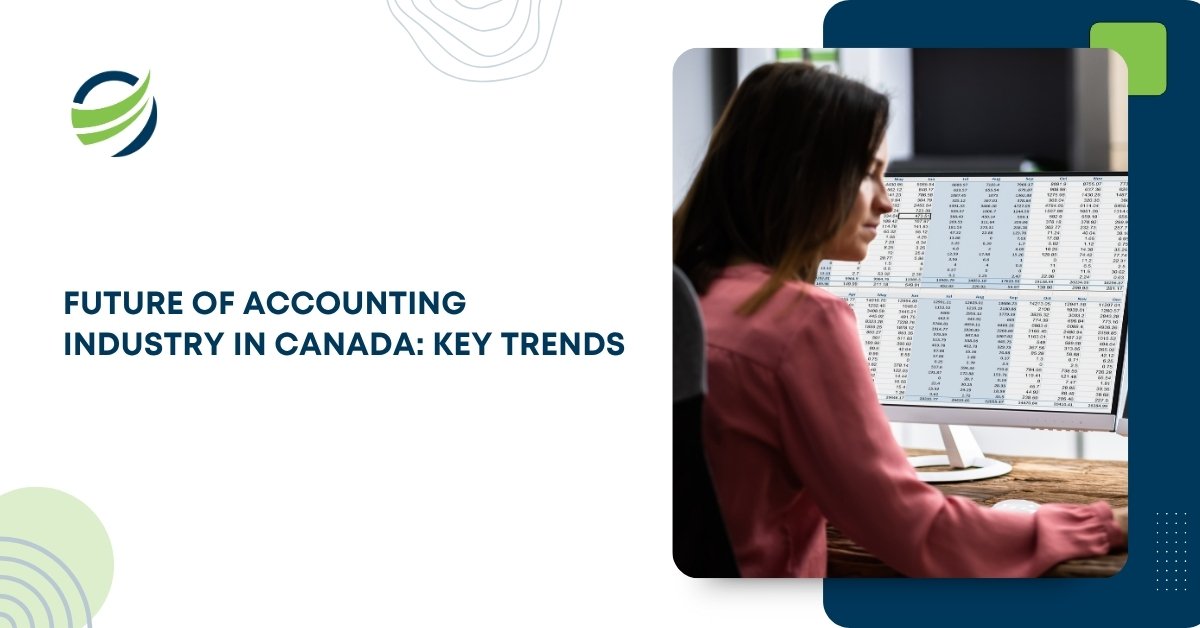As we look ahead to the future of the accounting industry in Canada, it’s clear that the profession is undergoing a profound transformation. Technologies once considered aspirational, such as artificial intelligence capable of analysing vast datasets and generating forecasts within seconds are now integral to modern accounting workflows.
Automation has eliminated repetitive tasks, allowing accountants to focus on higher-value activities like advisory and forecasting. This shift not only improves productivity but also enhances decision-making through real-time data access.
For Canadian firms, staying attuned to these developments is essential, not only to remain competitive, but to lead with confidence. In this article, NCS Canada examines the most significant accounting industry trends redefining the profession in 2025 and what they mean for the future of the accounting profession in Canada.

Artificial Intelligence
Artificial intelligence is quickly shaping the future of the accounting profession in Canada. According to a KPMG survey, over 82% of Canadian organisations are now applying or piloting AI in finance functions, surpassing the global average of 71%, with 63% already leveraging it for tax operations, nearly double the global rate of 34%.
Meanwhile, Statistique Canada highlights that 12.2% of businesses deployed AI tools across their operations in the past year, a marked increase from 6.1% in the previous period. Common applications include bookkeeping, tax research, compliance, and document review.
AI adoption in Canadian firms is just beginning. As the technology matures, it will play a key role in interpreting complex tax rules, offering real-time insights, and elevating advisory services. Embracing AI is no longer optional, it’s essential for staying competitive and delivering greater client value.
Automation
As automation technologies mature, Canadian firms are moving swiftly to modernise legacy systems and reduce manual inefficiencies.
The trend reflects a clear push toward standardisation, speed, and scale, crucial for navigating current issues in accounting like staffing shortages and rising client expectations.
Here’s how automation is shaping the future of accounting industry in Canada:
- As per Wolters Kluwer Canada 75% of firms report faster workflows using automation tools like autofill and task trackers.
- 65% say document collection from clients is now quicker and more organised.
- Real-time task visibility has led to a 30-40% improvement in team collaboration.
- Automation helps implement standardised, firm-wide processes.
- 56% of Quebec professionals plan to invest more in automation this year as per QuickBooks Canada 2024 Survey.
By reducing manual work and boosting efficiency, automation enables firms to focus on strategy and stay ahead of evolving accounting industry trends.
Cloud‑Based Accounting
Cloud-based accounting has become indispensable in Canadian firms, enabling secure, real-time collaboration and data access from any device. Here’s a concise rundown of market shifts specific to Canada:
- Canada’s cloud accounting services market is expected to grow from approximately USD 819 million in 2021 to USD 1.34 billion by 2025, and further to USD 3.78 billion by 2033, reflecting a strong CAGR of 13.9%.
- The broader Canadian public cloud market, which includes financial SaaS solutions, generated USD 10.8 billion in 2023 and is projected to see steady growth through 2030.
Cloud adoption is one of the most transformative accounting firm trends, driving cost efficiency, improved client collaboration, and scalability.
Blockchain Technology
Blockchain is gaining momentum in Canada’s accounting sector as firms seek more transparent and secure ways to manage financial data. With its tamper-proof, decentralised ledger, blockchain offers a new level of integrity, particularly in auditing.
Auditors can access real-time, immutable transaction records, significantly reducing errors and audit time.
Moreover, blockchain enhances the traditional double-entry system by allowing both parties to record transactions on a shared ledger that can’t be altered.
As regulatory expectations and the need for transparency rise, blockchain will play an increasingly important role in addressing current issues in accounting, particularly in audits and compliance.
Cybersecurity
As firms adopt more digital tools and store sensitive financial data in the cloud, cybersecurity has become a front-line issue. It’s no longer just a technical concern but a core part of operational strategy.
To protect data and maintain trust, Canadian firms must implement rigorous cybersecurity protocols, such as multi-factor authentication, staff training, and ongoing risk assessments. As digital threats rise, safeguarding client data is essential to the reputation and integrity of the entire accounting profession.
Data Analytics
Accounting firms in Canada generate massive volumes of financial data, from transactional records to client reports. Using data wisely is key to staying ahead.
According to a 2022 EXL/HFS survey, just 23% of finance and accounting teams had a truly mature data function, With 89% seeing data-driven finance as the future, the need for analytics investment is clear.
These insights underscore how data analytics is shaping both the current trends in accounting and its future. Firms that invest now can offer more predictive, advisory-driven services that enhance client outcomes and business growth.
Green Accounting and Sustainability
As sustainability becomes a central focus in Canada, green accounting is emerging as a critical strategy. It allows firms to track environmental costs, such as emissions and resource consumption, and integrate them into financial reporting.
This practice aligns closely with both client expectations and environmental regulations. For Canadian firms aiming to future-proof their operations, incorporating green accounting is not just an ethical step, it’s a strategic one that reflects the shifting definition of business value in the accounting profession.

Accounting Education and Skills Development
The skillset required for success in the accounting profession is evolving rapidly. While foundational knowledge in auditing, taxation, and compliance remains essential, today’s accountants in Canada must also be proficient in data analytics, digital tools, and emerging technologies like AI, blockchain, and cloud computing.
To keep pace, accounting education and certification programs are adapting. Updates to the CPA certification pathway now place greater emphasis on business analysis, reporting, and digital competency.
For firms and professionals invested in the future of accounting industry in Canada, ongoing upskilling is not optional, it’s vital for staying relevant in a rapidly changing landscape.
Remote and Hybrid Work
The COVID-19 pandemic redefined workplace norms, and Canada’s accounting industry is no exception. While 2020 marked a sharp rise in remote work, the trend has persisted, remote and hybrid work levels in Q2 2024 remain significantly higher than pre-pandemic 2019, according to Statistique Canada.
Firms that adopt flexible work models and invest in secure, collaborative technologies are not only improving productivity but also appealing to a broader talent pool. In Canada’s competitive accounting sector, offering hybrid flexibility is increasingly viewed as a strategic advantage.
Value-Based Pricing
Canadian accounting firms are moving away from hourly rates toward value-based pricing.This approach aligns fees with the outcomes delivered, focusing on results rather than time spent.
The result? Greater transparency and trust for clients, and enhanced profitability for firms. In today’s competitive market, this model not only reflects the strategic value of advisory services but also meets evolving client expectations across Canada.
Conclusion: The Future of Accounting Industry in Canada
The accounting industry in Canada is undergoing a profound transformation, driven by AI, data analytics, sustainability, regulatory changes, and the evolving expectations of clients and talent alike.
From embracing cloud-based workflows and blockchain to prioritising cybersecurity and value-based pricing, Canadian firms must pivot from traditional practices to agile, tech-enabled strategies.For firms looking to remain competitive in 2025 and beyond, the key lies in staying informed, investing in upskilling, and adopting innovations that align with evolving client needs.
The future of accounting profession in Canada is not just digital, it’s strategic, sustainable, and insight-driven.As these shifts accelerate, having the right accounting support can help firms navigate change with confidence and stay ahead of the curve.






